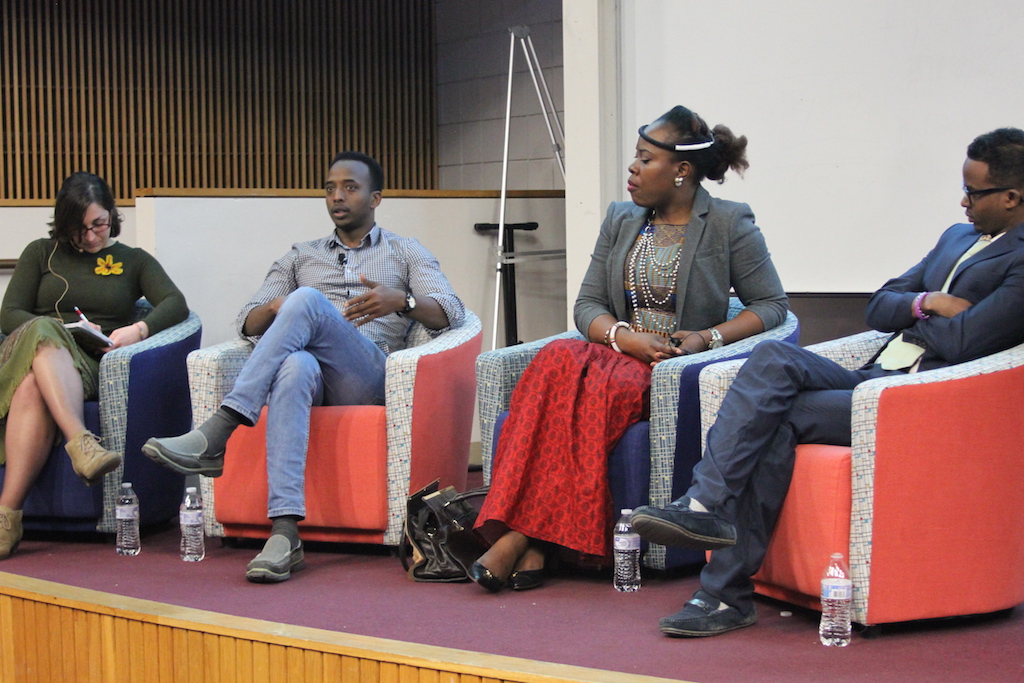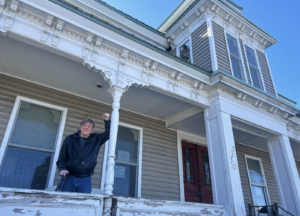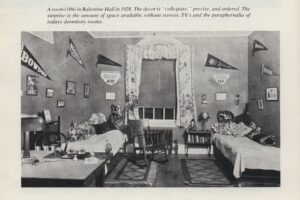If you’ve ever wondered what it would be like to immigrate to a foreign nation, last Wednesday’s panel titled “The New Immigrant Experience: Sharing Stories and Dispelling Myths” hosted by the University of Maine International Programs provided three unique perspectives on that experience. The event took place on March 28 in room 100 of the Donald P. Corbett building on campus and went from 4:30 to 7 p.m.
Beginning with a Taste of Africa reception in the foyer, attendees were encouraged to try traditional African dishes and mingle among each other. After about an hour, attendees congregated in the large lecture hall to begin the panel. The three panelists present were Abdi Iftin, Hamza Abdi and Angela Okafor, with UMaine Journalism and Communication Professor Liliana Herakova moderating.
Abdi began by introducing himself warmly to the audience and explaining his immigration story. He was born in the capital city of Djibouti, Djibouti in 1990 and completed primary, middle and high school there. He went on to achieve a bachelor’s degree in English literature at the University of Djibouti in 2013, and then ventured to France to complete his master’s in languages and culture. He describes his path to the United States as one that began long ago, but it wasn’t until 2016 that it became a reality. As an immigrant in Maine he revealed the obstacles abound for foreign newcomers, and life here is drastically different than his old one in Djibouti. “The language, food, weather, teachers, employment; these are all challenges that immigrants face.” He describes his experience acclimating to life in the U. S. as “very difficult,” citing the cold weather and snow as one of the biggest culture shocks.
Abdi noted that life for immigrants has become increasingly difficult under the current administration, saying “there is a fear in the heart of all immigrants. Will we be deported? Will today be our last day here?” Abdi is not an official citizen yet but is working toward that achievement, saying he will celebrate that day heartily. “I am just a simple immigrant, and it’s not easy.”
Okafor was the next to speak, and told many stories of her experiences immigrating from Nigeria to the U.S. Her bio described her as “Human. Daughter. Sister. Wife. Mother. Founder/sole practitioner (Okafor Law Practice – Immigration Practice). Owner/Director Tropical Tastes and Styles LLC (International Market). Board of Directors (Maine Multicultural Center). MBA student (Husson University). Public speaker. Self-trained fashion designer. Self-trained African hair enthusiast. ‘Obsessor’ of food and fashion. Third generation artist.”
Okafor explained that Bangor, Maine is not the most welcoming place for African immigrants, but over time she grew to love it here. She noted an important distinction about her heritage that many people seem to get wrong initially. “I am not from Africa. I am from Nigeria. Nigeria is a country within Africa. Africa is a continent.” She also commented on the struggles she overcame as an immigrant, but notably as a woman. She shared stories of job interviews she experienced where she faced sexism and xenophobia, but rose above such circumstances to well-deserved success.
Finally Iftin was handed the microphone, and began to speak from the perspective of not an immigrant, but a refugee. He hails from the African country of Somalia, which he noted is difficult to emigrate from because of the United States’ classification of Somalia as a hostile state. His stories about his experiences as a refugee coming to America spoke to issues that refugees face, such as the intense processes they must undergo to earn access to the United States.
After the introductions, the panel began, and each speaker shared their experiences as immigrants in the United States. Immigration is an issue that has become central to current events and President Donald Trump’s platform, and these kinds of programs are crucial to understanding and empathizing with immigrants’ perspectives and experiences. The obstacles they face are not limited to language barriers and employment challenges; many have faced xenophobic and racist harassment and discrimination as well. For all the people present at the panel, students, faculty and community members alike, this was an opportunity to listen, learn and expand their worldviews. As Okafor noted, “the more we open our minds the better for all of us.”
The event was sponsored by the College of Liberal Arts and Sciences, the Honors College, the Office of International Programs, the Division of Lifelong Learning, the Rising Tide Center, the School of Policy and International Affairs, Office of Multicultural Student Life and the Professional Employees Advisory Council.









